Thursday 16 January 2014 at 21h48
On Saturday 11 January, the race route of the Tour of Spain 2014 was officially presented in the Conference Center of Cádiz and the Vuelta a España 2014, 69th edition of this Spanish Grand Tour, will take place from Saturday 23 August 2014 au Sunday 14 September 2014 between the province of Cádiz and Santiago de Compostela!
In this article you'll find all information which is currently available about the race route of the Tour of Spain 2014!
The race route of the Tour of Spain 2014 in numbers
With 3,181.5 kilometers awaiting the riders from 23 August till 14 September 2014, between Jerez de la Frontera and Santiago de Compostela, the race route of the Vuelta a España 2014 is shorter than the previous editions (3358.9 in 2013, 3285.3 in 2012 and 3319.8 in 2011) but not less interesting for that reason!Here are some other numbers which summarise the Vuelta a España 2014:
- 5 plain stages
- 13 middle and high mountain stages, of which 8 high mountain
- 2 individual time trial stages (the 10th between Real Monasterio de Santa María de Veruela and Borja over 34.5 kilometers and the last stage around Santiago de Compostela over 10 kilometers)
- 1 team time trial stage (the first one, around Jerez de la Frontera over 12.6 kilometers)
- 2 rest days (on Monday 1st September 2014 and on Tuesday 9 September 2014)
- 12 never used stage starts (Algeciras, Mairena del Alcor, Alhendín, Baeza, Carboneras de Guadazaón, Real Monasterio de Santa María de Veruela, Belorado, San Martín del Rey Aurelio, Ortigueira, A Estrada, Salvaterra do Miño, Santo Estevo de Ribas de Sil)
- 9 never used stage finishes (San Fernando, Ronda, La Zubia, Alcaudete, Borja, Santuario de San Miguel de Aralar, La Camperona. Valle de Sabero, Monte CastroFr. Meis, Cangas do Morrazo)
40 mountains to climb, including 2 hors category, 13 of the first category, 11 of the second category and 14 of the third category
The stages of the Tour of Spain 2014 in detail
CONTINUE READING AFTER THIS ADVERTISEMENT
The table of the stages of the Vuelta a España 2014
First you'll find below the list of 21 stages which make up the Tour of Spain 2014. Click on a stage to read more details about it.| # | date | start | finish | distance |
|---|---|---|---|---|
| 1 | Sa. 23 August 2014 | Jerez de la Frontera | Jerez de la Frontera (team time trial) | 12,6 km |
| 2 | Su. 24 August 2014 | Algeciras | San Fernando | 174,4 km |
| 3 | Mo. 25 August 2014 | Cádiz | Arcos de la Frontera | 188 km |
| 4 | Tu. 26 August 2014 | Mairena del Alcor | Córdoba | 172,6 km |
| 5 | We. 27 August 2014 | Priego de Córdoba | Ronda | 182,3 km |
| 6 | Th. 28 August 2014 | Benalmádena | La Zubia | 157,7 km |
| 7 | Fr. 29 August 2014 | Alhendín | Alcaudete | 165,4 km |
| 8 | Sa. 30 August 2014 | Baeza | Albacete | 207,4 km |
| 9 | Su. 31 August 2014 | Carboneras de Guadazaón | Aramón Valdelinares | 181 km |
| R1 | Mo. 1st September 2014 | repos | ||
| 10 | Tu. 2 September 2014 | Real Monasterio de Santa María de Veruela (individual time trial) | Borja | 34,5 |
| 11 | We. 3 September 2014 | Pamplona | Santuario de San Miguel de Aralar | 151 km |
| 12 | Th. 4 September 2014 | Logroño | Logroño | 168 km |
| 13 | Fr. 5 September 2014 | Belorado | Obregón - Parque de Cabárceno | 182 km |
| 14 | Sa. 6 September 2014 | Santander | La Camperona - Valle de Sabero | 199 km |
| 15 | Su. 7 September 2014 | Oviedo | Lagos de Covadonga | 149 km |
| 16 | Mo. 8 September 2014 | San Martín del Rey Aurelio | La Farrapona - Lagos de Somiedo | 158,8 km |
| R2 | Tu. 9 September 2014 | repos | ||
| 17 | We. 10 September 2014 | Ortigueira | A Coruña | 174 km |
| 18 | Th. 11 September 2014 | A Estrada | Monte Castrove - Meis | 173,5 km |
| 19 | Fr. 12 September 2014 | Salvaterra do Miño | Cangas do Morrazo | 176,5 km |
| 20 | Sa. 13 September 2014 | Santo Estevo de Ribas de Sil | Puerto de Ancares | 163,8 km |
| 21 | Su. 14 September 2014 | Santiago de Compostela (individual time trial) | Santiago de Compostela - El Final del Camino | 10 km |
The map of the Tour of Spain 2014
Hereunder you'll find the official map of the Vuelta a España 2014. Click on the map to zoom in on it.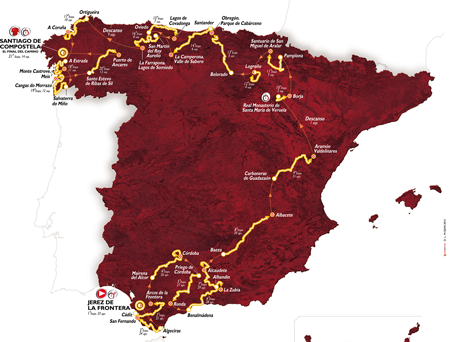
The video of the race route of the Vuelta a España 2014
Hereunder you can find the official 3D presentation of the Tour of Spain 2014.1/ Saturday 23 August 2014 - Jerez de la Frontera > Jerez de la Frontera - 12.6 km - team time trial
The first stage of the Tour of Spain 2014 is a team time trial, over a distance of 12.6 kilometers, in Jerez de la Frontera. This timed effort will take place on a completely flat but quite technical race route in this start city of the Vuelta a España 2014.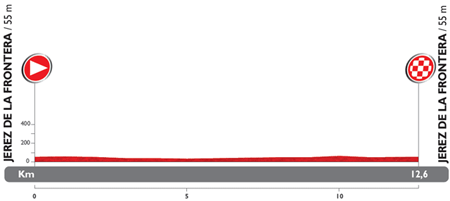
CONTINUE READING AFTER THIS ADVERTISEMENT
2/ Sunday 24 August 2014 - Algeciras > San Fernando - 174,4 km - plain
The second stage of the Vuelta will be the first stage in line and this will take place between Algeciras and San Fernando over a distance of about 175 kilometers. In order to get to the start, the riders and followers of the race will have done a quite important transfer after the time trial the day before in order to get to the stage start city on the seaside. It'll be a plain stage with only one 3rd category climb early in the stage (its summit will be reached after 11.2 kilometers), the Alto del Cabrito. The stage follows the coast line but if the sprinters don't get caught in a break-up of the peloton due to the side wind, this stage will be made for them!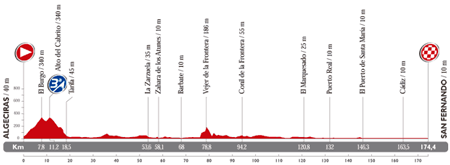
3/ Monday 25 August 2014 - Cádiz > Arcos de la Frontera - 188 km - middle mountain
The 3rd stage will end the visit of the province of Cádiz, with a stage which will go from its capital, Cádiz, to Arcos de la Frontera a bit further north-east.188 kilometers separate the start from the finish and 3 climbs of the 3rd category will cheer up this stage (Alto del Picacho, Alto del Camino and Puerto del Boyar) and even though the last part of the stage is pretty much downhill, it is clear that the last two kilometers go uphill and are quite steep thus probably leading to a selection before the finish!
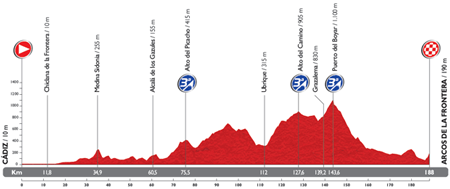
4/ Tuesday 26 August 2014 - Mairena del Alcor > Córdoba - 172,6 km - middle mountain
An almost completely flat stage for this 4th stage, at least for the first 115 kilometers that is. Indeed, after the start from Mairena del Alcor the race route awaiting the riders will be completely flat, until they get on the Alto de San Jerónimo (3rd category) and with the climb of the Alto del Catorce por ciento (which could be 14% steep if we have to believe what the name says and which was also on the programme before the finish in Córdoba in 2009 when the stage was won by Lars Boom) it is well probable that a small group or a solo adventure seeker manages to reach the finish in Córdoba first!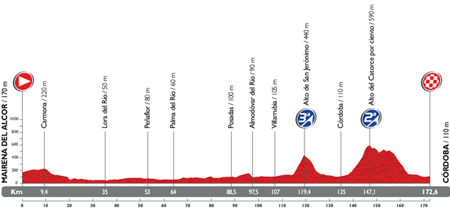
5/ Wednesday 27 August 2014 - Priego de Córdoba > Ronda - 182,3 km - plain
The 5th stage is again a stage which is qualified as "plain" and it's indeed truue that the profile between Priego de Córdoba and Ronda doesn't show much altitude variation, except for the very end of the stage with the climb of the Puerto del Sotillo, of the 3rd category. The sprinters could thus again miss the opportunity for a victory!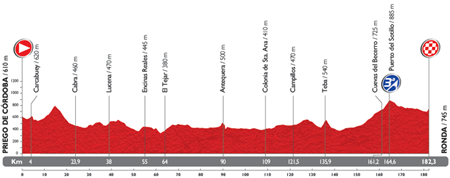
CONTINUE READING AFTER THIS ADVERTISEMENT
6/ Thursday 28 August 2014 - Benalmádena > La Zubia - 157,7 km - high mountain
The 6th stage of the Vuelta a España 2014 is the first real high mountain stage and in addition to the two 2nd category (Alto de Zafarraya) and 3rd category (Alto de Bermejal) climbs we find after 50 kilometers in the race, the stage ends with a mountain top finish, on top of a 1st category climb, Cumbres Verdes (La Zubia), which is a short but very steep climb (up to 13%).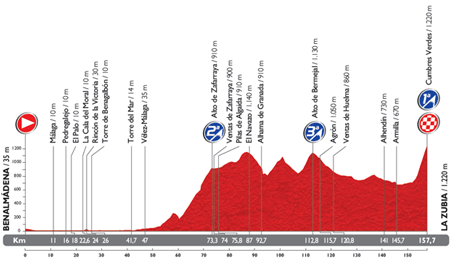
7/ Friday 29 August 2014 - Alhendín > Alcaudete - 165,4 km - middle mountain
This stage at the end of the first week of the Tour of Spain 2014 is a middle mountain stage starting in Alhendín, the perfect occasion for a small breakaway group or for a solo breakaway to try and go find a stage victory in Alcaudete.After about thirty kilometers, the road goes uphill to reach the top of the Alto de Íllora (2nd category) at kilometer 38.4. The rest of the stage is slightly hilly until the foot of the second climb, the Alto Ahillo de 3rd category. The final part of the stage is slightly uphill but with an average climb of 4% it shouldn't scare of any potential breakaway riders!
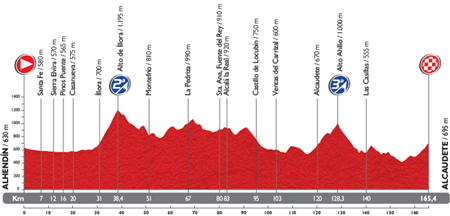
8/ Saturday 30 August 2014 - Baeza > Albacete - 207,4 km - plain
On Saturday 30 August we finally leave the south-western part of Spain where the previous stages pretty much went back-and-forth, for a stage with a bit of a surprising profile for a Saturday which almost guarantees a good TV audience. Indeed, a real plain stage is on the programme this Saturday between Baeza and Albacete over almost 210 kilometers.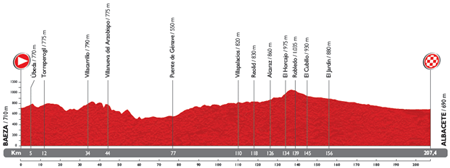
9/ Sunday 31 August 2014 - Carboneras de Guadazaón > Aramón Valdelinares - 181 km - high mountain
On Sunday, after quite an important transfer, a high mountain stage will await the riders, even though it got this qualification mainly because of the final climb of the 1st category, towards Aramón Valdelinares. Indeed, the stage starts as a rolling stage after the start from Carboneras de Guadazaón, with a progressive climb towards Puerto Hontanorio. Only at kilometer 120 the riders get on the top of the first KOM classified climb, the Puerto de Cabigordo (3rd category). Closer to the finish they'll climb the Puerto San Rafael (2nd category) and after the descent of this mountain they'll start with the final climb.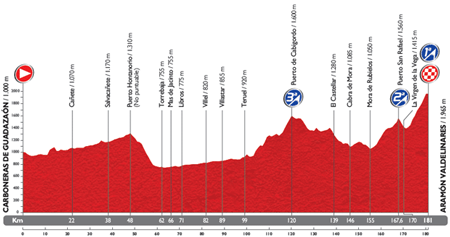
CONTINUE READING AFTER THIS ADVERTISEMENT
R1/ Monday 1er September 2014 - rest day
After this pretty intense first week, the riders can get some rest this Monday during the first of two rest days of this Vuelta a España 2014.10/ Tuesday 2 September 2014 - Real Monasterio de Santa María de Veruel > Borja - individual time trial - 34.5 km
After this well deserved moment of rest, the first individual time trial is on the programme of this Tour of Spain 2014, over a distance of 34.5 kilometers between Real Monasterio de Santa María de Veruel and Borja. Within this distance, every rider has to climb a 3rd category difficulty in the first half of the race against the clock, the Alto del Moncayo, before they start the descent towards the finish line.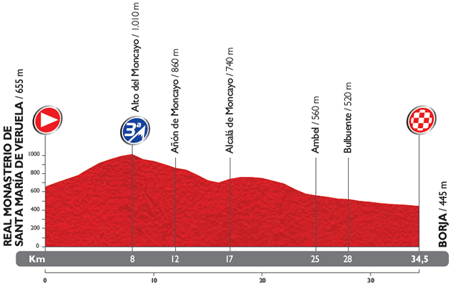
11/ Wednesday 3 September 2014 - Pamplona > Santuario de San Miguel de Aralar - 151 km - high mountain
The 11th stage will not be easy either after the time trial the day before, with a profile which starts flat, but which gets harder towards the end of the stage. Indeed, it's after about one hundred kilometers that the road goes uphill, first towards the top of the Puerto de Lizarraga, a 2nd category climb, and after the descent and a short visit of the valley, the riders start the final climb, towards Alto San Miguel de Aralar, a 1st category climb at the Santuario de San Miguel de Aralar.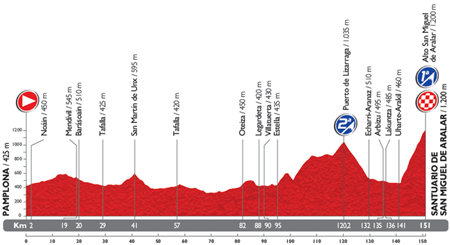
12/ Thursday 4 September 2014 - Logroño > Logroño - 168 km - plain
The 12th stage starts and finishes in Logroño and will take place on a 21 kilometer long circuit, which will be done 8 times. It thus seems that this stage is completely identical to the 5th stage of the Vuelta a España 2012!In 2012, this stage was won in a sprint by John Degenkolb and it's well probable that this stage will again end in a sprint in 2014.
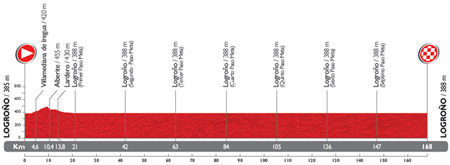
CONTINUE READING AFTER THIS ADVERTISEMENT
13/ Friday 5 September 2014 - Belorado > Obregón - Parque de Cabárceno - 182 km - middle mountain
The 13th stage will take place on Friday 5 September and it will be a middle mountain stage starting in Belorador.The first half of the stage is quite rolling before we get on a more hilly part. Indeed, two 3rd category climbs will be part of this stage, the Alto Estacas de Trueba and the Puerto de la Braguia, which will immediately be followed by a 2nd category climb, the Alto del Caracol. After the descent, the final part of the stage will be slightly uphill, towards the finish in Obregón at the Parque de Cabárceno.
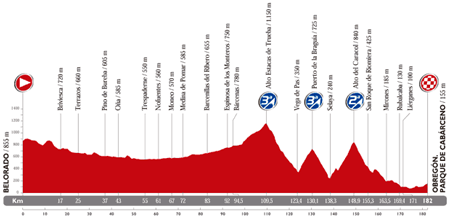
14/ Saturday 6 September 2014 - Santander > La Camperona - Valle de Sabero - 199 km - high mountain
On the Saturday of this 3rd weekend of the Vuelta a España 2014 a real high mountain will be on the programme!Starting in Santander, the first 60 kilometers of this stage are quite easy but the riders then get on the climbs of the Collada de la Hoz (2nd category) and after the descent the riders will start a progressive climb towards the start of a 1st category climb, the Puerto de San Glorio. Even though the rest of the stage presents a slightly downhill profile, the difficulties won't stop there because the white line will be drawn on top of La Camperona (Valle de Sabero), a first category climb, which present steep parts, especially in the last kilometers, going up to 24%!
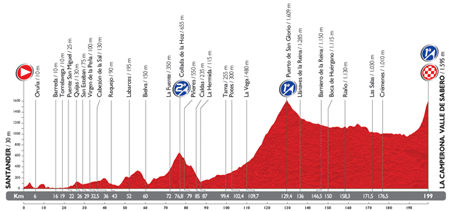
15/ Sunday 7 September 2014 - Oviedo > Lagos de Covadonga - 149 km - high mountain
On Sunday another high mountain stage will be on the programme but its profile will be quite different.Indeed, the first 106 kilometers present an almost completely flat profile followed by a 2nd category climb, the Puerto del Torno. The descent of this climb will be followed by the final climb, towards the first hors category climb of this Tour of Spain 2014, at Lagos de Covadonga. This climb has been part of the Vuelta a España before, in 2010 and 2012 for example. In 2012, Ruben Perez finished 2nd, in a small group with Lloyd Mondory at a bit over 2 minutes behind Antonio Piedra Perez.
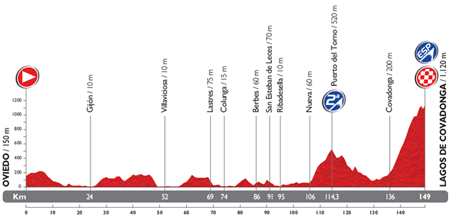
16/ Monday 8 September 2014 - San Martín del Rey Aurelio > La Farrapona - Lagos de Somiedo - 158,8 km - high mountain
After this high mountain weekend, the stage on Monday, the 16th of the Vuelta a España 2014, will be yet another high mountain stage, the day before the second rest day.On this stage, for which the riders will start in San Martín del Rey Aurelio and almost immediately start the climb of the Alto de la Colladona of which the top will be reached after only 16 kilometers in the stage. About fourty kilometers slightly downhill will follow this first climb, before the riders get on another first category climb, the Alto del Cordal of which the descent will immediately go on in the climb of the Alto de la Cobertoria, 1st category as well. A long descent and a progressive climbing part will bring the riders to the foot of the next 1st category climb, the Puerto de San Lorenzo and once the riders reach the top, they'll see that the descente will immediately be followed by the final climb, 1st category as well, towards the finish at La Farrapona - Lagos de Somiedo.
This is clearly the queen stage of this 3 weeks long race, with its 5 first category climbs in a relatively short distance. It is well possible that the overall victory of the Vuelta a España 2014 will be decided in this stage!
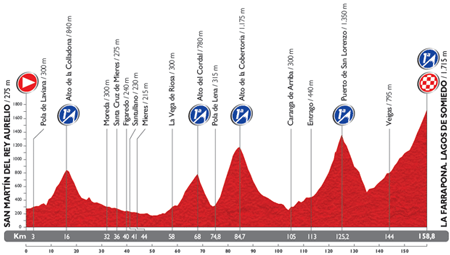
CONTINUE READING AFTER THIS ADVERTISEMENT
R2/ Tuesday 9 September 2014 - rest day
After this queen stage it will be time to enjoy another rest day, before the 5 last stages of this Tour of Spain 2014.17/ Wednesday 10 September 2014 - Ortigueira > A Coruña - 174 km - plain
The race will start up again in a quiet way after this second rest day and the sprinters who have managed to hold on so far will have another chance to win a stage. Indeed, between Ortigueira and A Coruña there are some variations in altitude but this stage can clearly be seen as a flat stage as you can discover in the profile hereunder.
18/ Thursday 11 September 2014 - A Estrada > Monte Castrove - Meis - 173,5 km - high mountain
After this easy stage, the 19th stage is again a high mountain stage. At first look it doesn't really seem to be a high mountain stage but the double climb of the Alto Monte Castrove, a 5 kilometer climb with parts up to 12%, which makes it a 2nd category climb. In the last 25 kilometers of the stage the riders will do this climb twice and the second one will thus be the final climb of this stage.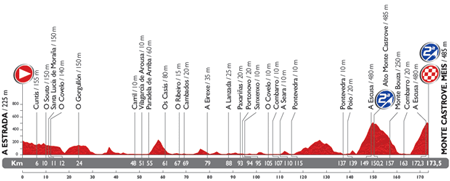
19/ Friday 12 September 2014 - Salvaterra do Miño > Cangas do Morrazo - 176,5 km - middle mountain
We're getting closer to the end with this middle mountain stage starting in Salvaterra do Miño.In the 176.5 kilometer which separate this start from the finish in Cangas do Morrazo, the riders will find a first first category climb in the first half of the stage, the Alto do Monte da Groba. Even though this climb could already lead to a first selection in the peloton, it will especially be the second 1st category climb, the Alto do Morrazo, which will decide who will win this stage because the top of this climb will be at 19 kilometers from the finish and after its descent there will only be 6.5 kilometers from the foot of the climb till the finish line.
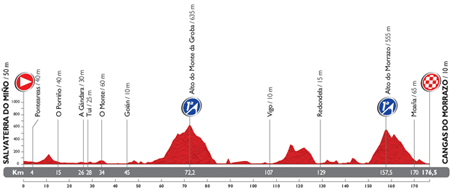
CONTINUE READING AFTER THIS ADVERTISEMENT
20/ Saturday 13 September 2014 - Santo Estevo de Ribas de Sil > Puerto de Ancares - 163,8 km - high mountain
The forelast stage of the Vuelta a España 2014 will be the second one with a hors category climb towards the finish, the Puerto de Ancares. This will not be the only difficulty which makes this stage starting in Santo Estevo de Ribas de Sil a nice high mountain stage.Indeed, after 17 kilometers in the race, the riders will already have reached the first top, of a small 3rd category climb that is, the Alto Cima Da Vila, but the rest of the stage will continue to be hilly, especially in the second half of it. The combination of the Alto de Vilaesteva (2nd category) and the Alto de O Lago will be followed by a short less hilly part before the riders attack the final part of this stage with a first category climb, the Alto de Folgueiras de Aigas, and the final climb towards the second hors category top of this race.
If the general classification didn't show enough time gaps so far, this stage will most probably help define the hierarchy of the race or maybe redefine it if it was already determined, the day before the final time trial.
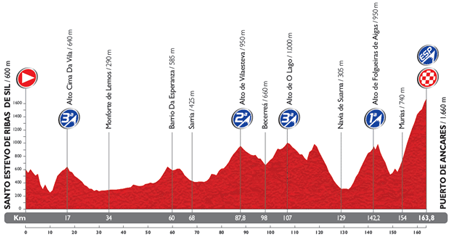
21/ Sunday 14 September 2014 - Santiago de Compostela > Santiago de Compostela - El Final del Camino - individual time trial - 10 km
The end of the road. That's the "subtitle" the organisor of the Vuelta a España gave to this stage which will take place as a time trial in Santiago de Compostela, the famous pelgrims' destination!In the relatively short distance (10 kilometers) and with a completely flat profile, this stage will probably not mess up the general classification but it will allow to confirm it so we'll finally know the name of the winner of this 69th edition of the Tour of Spain, at the end of the road in Santiago de Compostela.
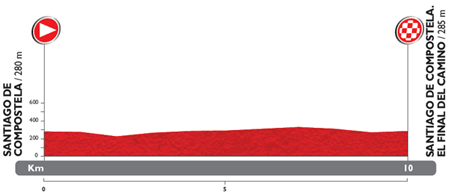
You have just discovered a detailed presentation of all stages of the Vuelta a España 2014 and the profiles of each of the stages. Before the start of this 69th edition of the Tour of Spain, you'll of course find the detailed race routes of this Spanish Grand Tour on Google Maps/Google Earth on velowire.com! door Thomas Vergouwen
Vond u dit artikel interessant? Laat het uw vrienden op Facebook weten door op de buttons hieronder te klikken!
10 comments | 25916 views
this publication is published in: Vuelta a España | Vuelta a España 2014





 by Bernard over
by Bernard over
Merci Thomas pour ce joli travail!
Un parcours qui semble, de premier abord, un peu moins interessant que ceux de 2012 et 2013.
Merci pour cette page Thomas. Elle sera surtout très utile au moment de la course. Je me souviens encore avoir le détail de Paris-Roubaix devant les yeux pendant la course … Continu.
Pour le parcours on reste dans le ''stéréotype'' Vuelta des dernières années.
Petites améliorations : les chronos. Ainsi que les étapes de la Farrapona et du Ancares avec un peu plus d'enchainement. Mais les arrivées au sommets sont toujours les mêmes (dans le profil surtout) et toujours amené de la même façon.
Un clm par équipe : oui mais compenser par quoi ensuite ? La première semaine ne propose pas grand choses et sont des lignes d'arrivées revus et revus (Cordoba). Pourquoi éviter la Sierra Nevada comme ça ? 2011 était bien comme départ.
Le clm après le jour de repos est bien.
Logrono ! On atteint le ''summum'' du ridicule.
Somiedo : la meilleur étape (allier au Repos). Ancares un cran en dessous.
Pour ces 10 derniers kms … on ne sait jamais … Surtout vu ce parcours. Je ne suis pas du tout contre contrairement à certains à mon avis. Mais je préfèrerais bien sûr un clm long.
En gros, où sont les arrivées en descentes dans les grands Tours !?
Ceci confirme mon idée : le Tour de France est le meilleur parcours devant le Giro (car il y a de plus belles montées et donc du plus belles arrivées au sommet). La Vuelta reste encore derrière mais le relief est le principal responsable je crois. Mais ce sont au Organisateur de proposer autre chose. Cependant, il n'y a aucune réelle intention de changer …
Espérons que Juillet ne soit pas influencer par cette ''mode'' Mai-Septembre.
Juste un détail: lors de la 18ème étape, le Monte Castrove ne peut pas faire 5km à 12%, car cela donnerait 600 mètres de dénivelé, or il culmine à 485 mètres.
De la même manière, dans la 4ème étape, si l'Alto del Catorce por Ciento porte bien son nom en raison de son pourcentage moyen comme l'indique Thomas, alors il fait trois km maximum.
Moi, je suis franchement déçu par ce parcours, qui est largement en dessous du Tour et du Giro 2014. l'Angliru est passé à la trappe, et le reste est franchement pas terrible dut out.
@julien s, pour le détail mentionné en commentaire #4, en effet, il manquait un bout de la phrase pour le Monte Castrove : ce sont bien 5 kilomètres mais avec des pentes allant jusqu'à 12%, ce n'est pas la pente moyenne.
Pour l'Alto del Catorce por Ciento, je me demande finalement s'il ne s'agit pas de la même chose également, mais j'avoue ne pas en être sûr. Je n'ai pas plus d'informations à son sujet, ni même lors de la Vuelta 2009 (j'ai peut-être mal cherché, je n'y ai pas passé énormément de temps) .. mais j'avoue qu'avec ce nom on n'aurait presqu'aucune raison de croire qu'il ne fait pas 14% ...
Bien présenté, Thomas. Merci.
Pour le reste...et comme toujours, CE SONT LES COUREURS QUI FERONT LA COURSE... quel que soit le terrain (mais aussi, souvent, en fonction des conditions climatiques)!
"P 22"
Bonjour tout le monde !
Je découvre le commentaire N° 7 avec surprise. Je suis "P 22"...mais ce n'est pas moi qui ai posté ce commentaire à propos de La Vuelta 2015. Ça m'intrigue...pour le moins.
Cordialement,
Le vrai "P 22"
@P 22 : un commentaire publié avec la même adresse mail (donnée non visible, à part pour moi) et depuis une adresse IP dans le même range de votre fournisseur d'internet, j'aurais tendance à croire que les commentaires aient bien été publiés par la seule et même personne ...
Exact. J'ai cru que c'était un message posté AUJOURD'HUI, 5 mars !
Avec mes excuses...et l'expression de mon soulagement.
Merci Thomas.
P 22